Critical Review of International Comparative HRM Article Assessment
VerifiedAdded on 2022/10/11
|13
|3788
|6
Report
AI Summary
This report presents a critical review of the article "Expatriates of Host‐Country Origin in South Eastern Europe: Management Rationales in the Finance Sector" by Bešić and Ortlieb (2018). The review analyzes the article's central argument, which focuses on the management of expatriates of host-country origin and their impact on company operations and competitive advantage in international markets, particularly in the finance sector of South Eastern Europe. The review explores the literature review, methodology (qualitative approach using semi-structured interviews), and findings, which highlight the benefits of employing host-country origin expatriates in terms of facilitating relationships, enhancing resource accrual, and offering competitive advantages. It also discusses the article's implications for international human resource management, including the importance of understanding cultural and social factors. The review concludes with reflections on the article's strengths and limitations, offering insights for future research in the field of international HRM.
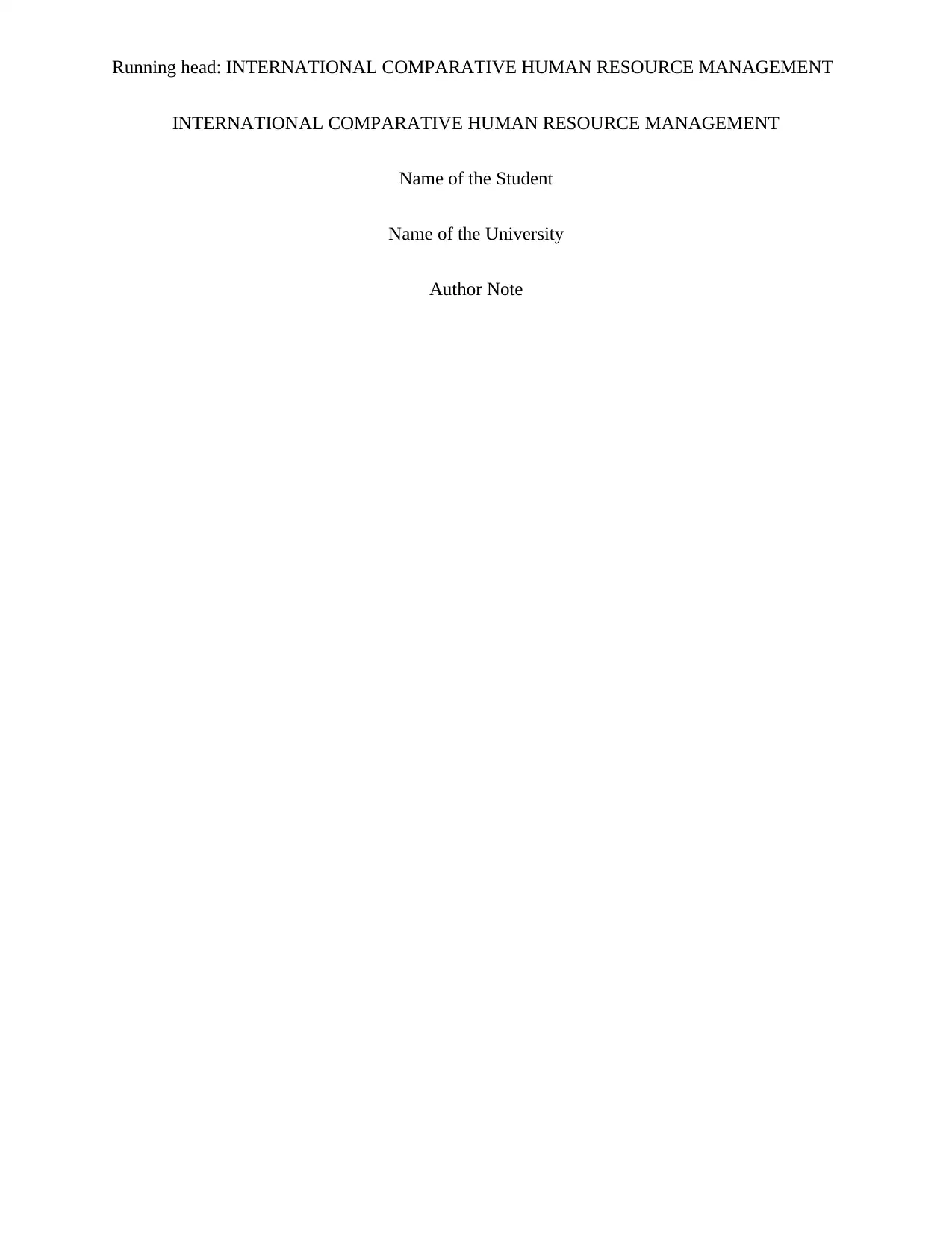
Running head: INTERNATIONAL COMPARATIVE HUMAN RESOURCE MANAGEMENT
INTERNATIONAL COMPARATIVE HUMAN RESOURCE MANAGEMENT
Name of the Student
Name of the University
Author Note
INTERNATIONAL COMPARATIVE HUMAN RESOURCE MANAGEMENT
Name of the Student
Name of the University
Author Note
Paraphrase This Document
Need a fresh take? Get an instant paraphrase of this document with our AI Paraphraser
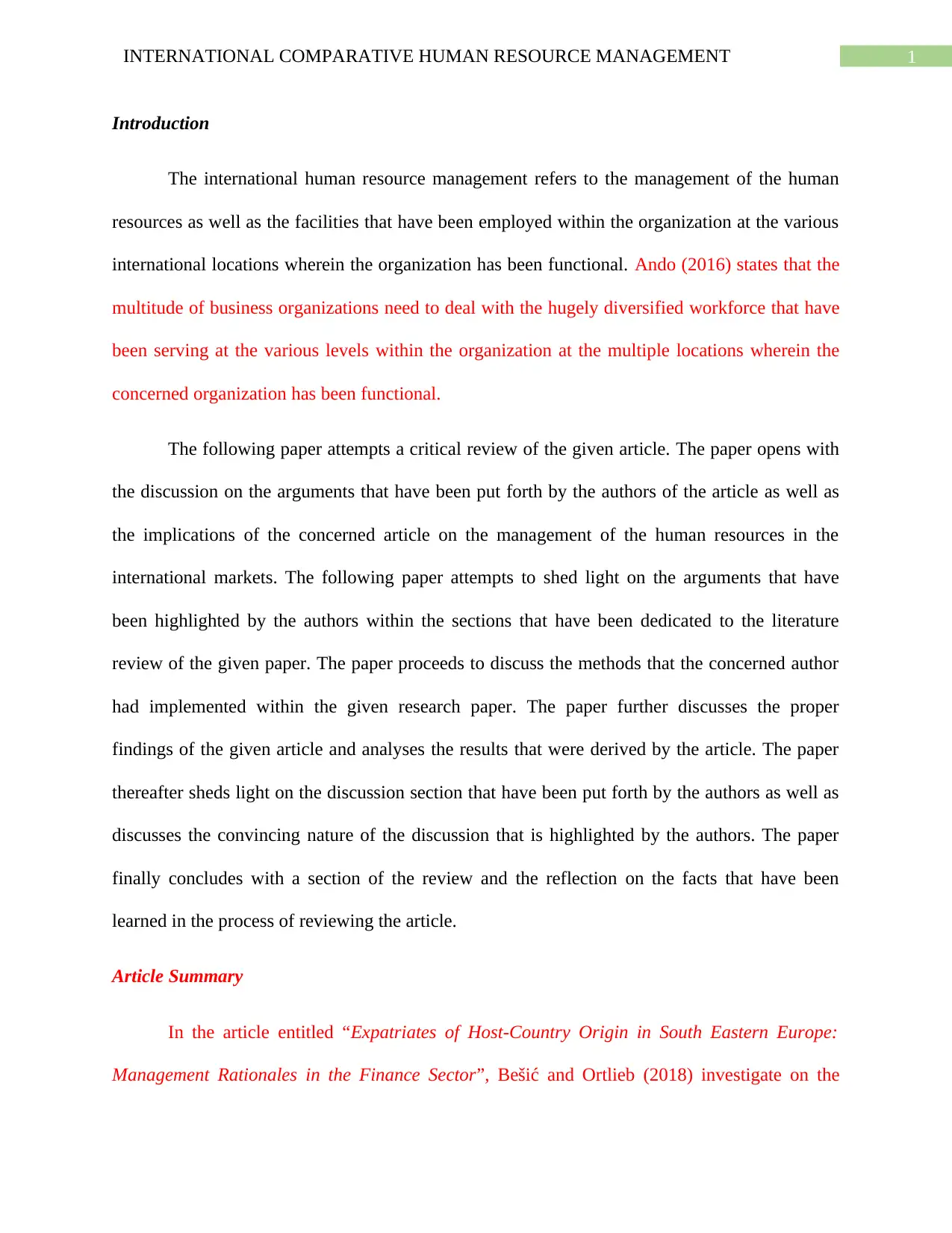
1INTERNATIONAL COMPARATIVE HUMAN RESOURCE MANAGEMENT
Introduction
The international human resource management refers to the management of the human
resources as well as the facilities that have been employed within the organization at the various
international locations wherein the organization has been functional. Ando (2016) states that the
multitude of business organizations need to deal with the hugely diversified workforce that have
been serving at the various levels within the organization at the multiple locations wherein the
concerned organization has been functional.
The following paper attempts a critical review of the given article. The paper opens with
the discussion on the arguments that have been put forth by the authors of the article as well as
the implications of the concerned article on the management of the human resources in the
international markets. The following paper attempts to shed light on the arguments that have
been highlighted by the authors within the sections that have been dedicated to the literature
review of the given paper. The paper proceeds to discuss the methods that the concerned author
had implemented within the given research paper. The paper further discusses the proper
findings of the given article and analyses the results that were derived by the article. The paper
thereafter sheds light on the discussion section that have been put forth by the authors as well as
discusses the convincing nature of the discussion that is highlighted by the authors. The paper
finally concludes with a section of the review and the reflection on the facts that have been
learned in the process of reviewing the article.
Article Summary
In the article entitled “Expatriates of Host‐Country Origin in South Eastern Europe:
Management Rationales in the Finance Sector”, Bešić and Ortlieb (2018) investigate on the
Introduction
The international human resource management refers to the management of the human
resources as well as the facilities that have been employed within the organization at the various
international locations wherein the organization has been functional. Ando (2016) states that the
multitude of business organizations need to deal with the hugely diversified workforce that have
been serving at the various levels within the organization at the multiple locations wherein the
concerned organization has been functional.
The following paper attempts a critical review of the given article. The paper opens with
the discussion on the arguments that have been put forth by the authors of the article as well as
the implications of the concerned article on the management of the human resources in the
international markets. The following paper attempts to shed light on the arguments that have
been highlighted by the authors within the sections that have been dedicated to the literature
review of the given paper. The paper proceeds to discuss the methods that the concerned author
had implemented within the given research paper. The paper further discusses the proper
findings of the given article and analyses the results that were derived by the article. The paper
thereafter sheds light on the discussion section that have been put forth by the authors as well as
discusses the convincing nature of the discussion that is highlighted by the authors. The paper
finally concludes with a section of the review and the reflection on the facts that have been
learned in the process of reviewing the article.
Article Summary
In the article entitled “Expatriates of Host‐Country Origin in South Eastern Europe:
Management Rationales in the Finance Sector”, Bešić and Ortlieb (2018) investigate on the
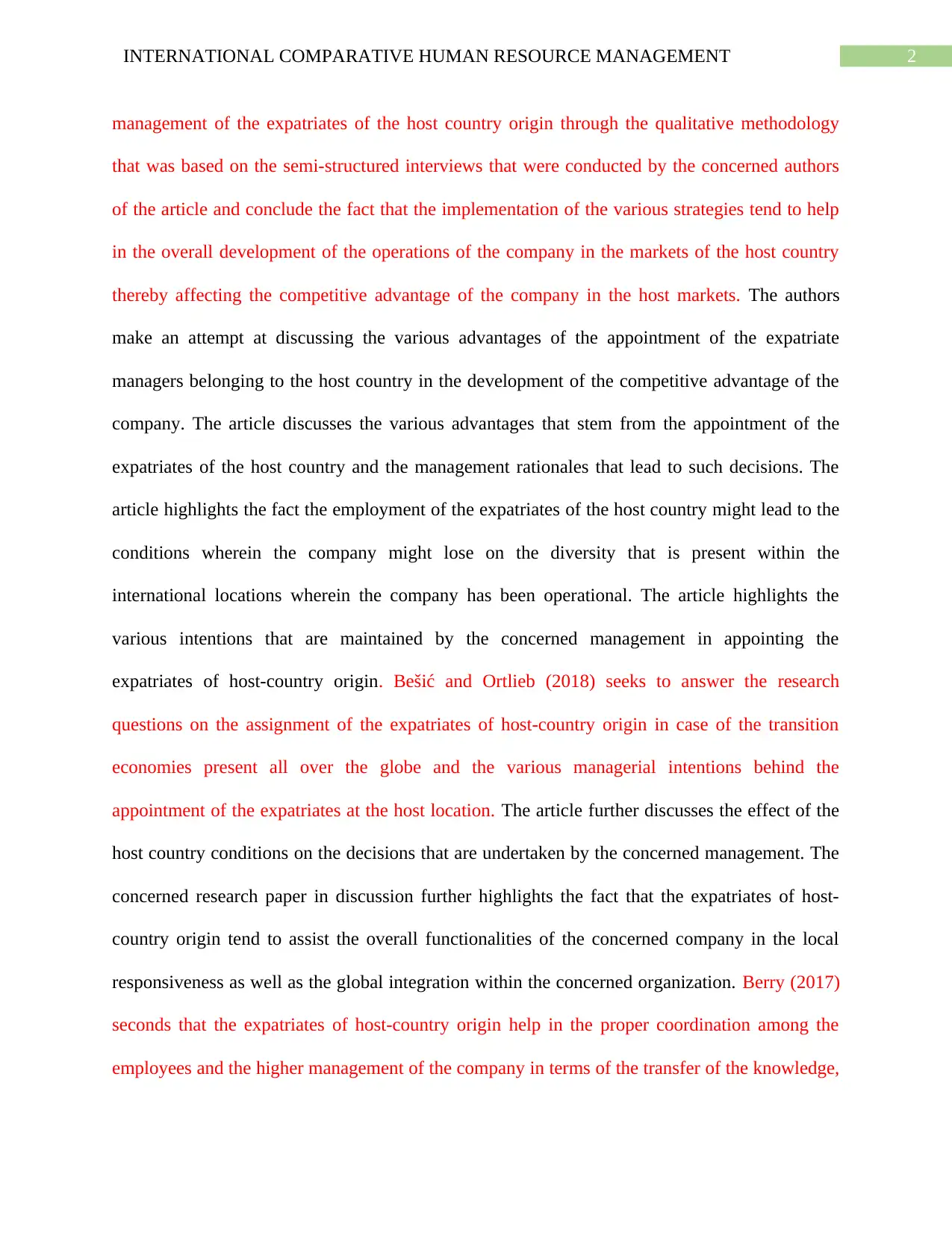
2INTERNATIONAL COMPARATIVE HUMAN RESOURCE MANAGEMENT
management of the expatriates of the host country origin through the qualitative methodology
that was based on the semi-structured interviews that were conducted by the concerned authors
of the article and conclude the fact that the implementation of the various strategies tend to help
in the overall development of the operations of the company in the markets of the host country
thereby affecting the competitive advantage of the company in the host markets. The authors
make an attempt at discussing the various advantages of the appointment of the expatriate
managers belonging to the host country in the development of the competitive advantage of the
company. The article discusses the various advantages that stem from the appointment of the
expatriates of the host country and the management rationales that lead to such decisions. The
article highlights the fact the employment of the expatriates of the host country might lead to the
conditions wherein the company might lose on the diversity that is present within the
international locations wherein the company has been operational. The article highlights the
various intentions that are maintained by the concerned management in appointing the
expatriates of host‐country origin. Bešić and Ortlieb (2018) seeks to answer the research
questions on the assignment of the expatriates of host‐country origin in case of the transition
economies present all over the globe and the various managerial intentions behind the
appointment of the expatriates at the host location. The article further discusses the effect of the
host country conditions on the decisions that are undertaken by the concerned management. The
concerned research paper in discussion further highlights the fact that the expatriates of host‐
country origin tend to assist the overall functionalities of the concerned company in the local
responsiveness as well as the global integration within the concerned organization. Berry (2017)
seconds that the expatriates of host‐country origin help in the proper coordination among the
employees and the higher management of the company in terms of the transfer of the knowledge,
management of the expatriates of the host country origin through the qualitative methodology
that was based on the semi-structured interviews that were conducted by the concerned authors
of the article and conclude the fact that the implementation of the various strategies tend to help
in the overall development of the operations of the company in the markets of the host country
thereby affecting the competitive advantage of the company in the host markets. The authors
make an attempt at discussing the various advantages of the appointment of the expatriate
managers belonging to the host country in the development of the competitive advantage of the
company. The article discusses the various advantages that stem from the appointment of the
expatriates of the host country and the management rationales that lead to such decisions. The
article highlights the fact the employment of the expatriates of the host country might lead to the
conditions wherein the company might lose on the diversity that is present within the
international locations wherein the company has been operational. The article highlights the
various intentions that are maintained by the concerned management in appointing the
expatriates of host‐country origin. Bešić and Ortlieb (2018) seeks to answer the research
questions on the assignment of the expatriates of host‐country origin in case of the transition
economies present all over the globe and the various managerial intentions behind the
appointment of the expatriates at the host location. The article further discusses the effect of the
host country conditions on the decisions that are undertaken by the concerned management. The
concerned research paper in discussion further highlights the fact that the expatriates of host‐
country origin tend to assist the overall functionalities of the concerned company in the local
responsiveness as well as the global integration within the concerned organization. Berry (2017)
seconds that the expatriates of host‐country origin help in the proper coordination among the
employees and the higher management of the company in terms of the transfer of the knowledge,
⊘ This is a preview!⊘
Do you want full access?
Subscribe today to unlock all pages.

Trusted by 1+ million students worldwide
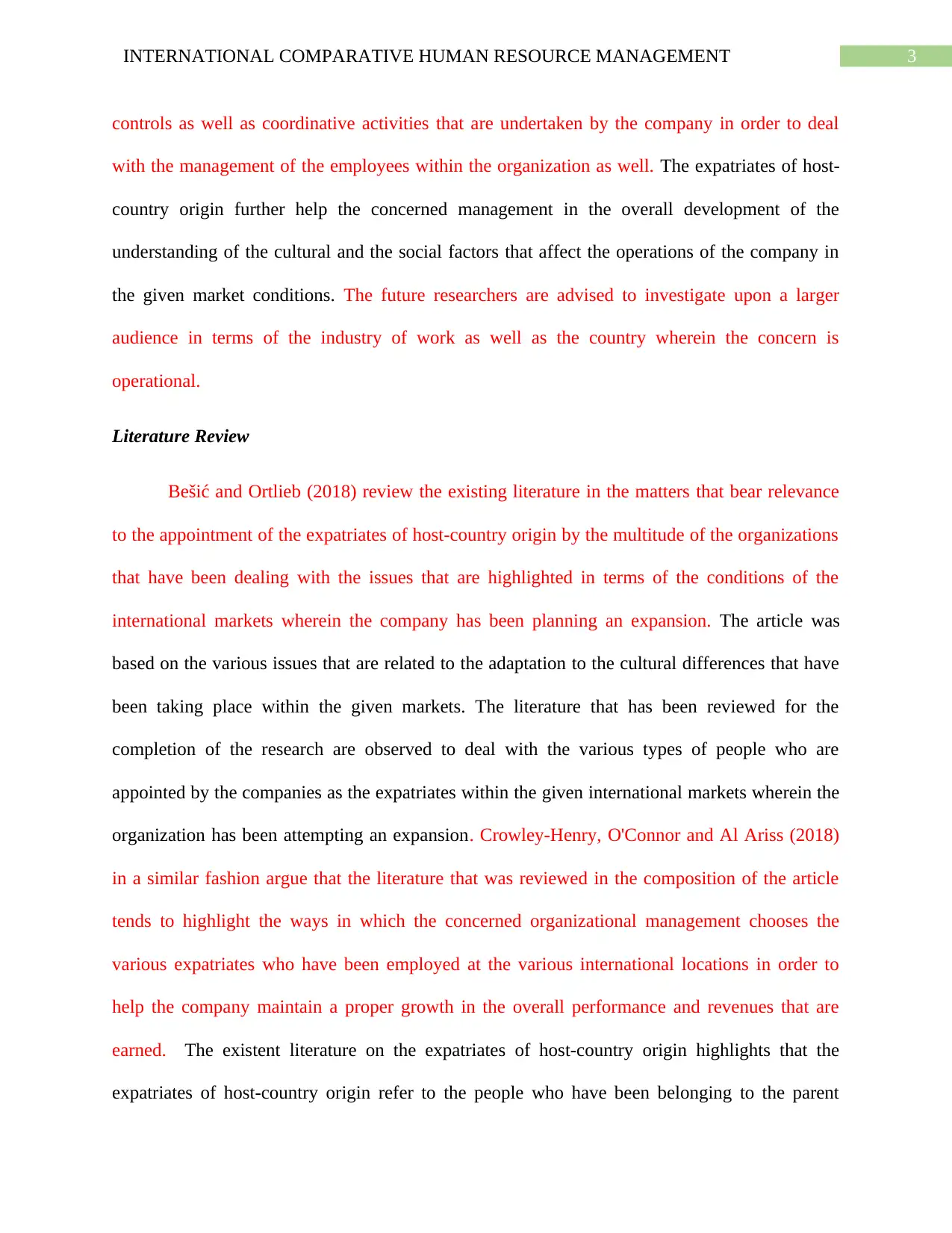
3INTERNATIONAL COMPARATIVE HUMAN RESOURCE MANAGEMENT
controls as well as coordinative activities that are undertaken by the company in order to deal
with the management of the employees within the organization as well. The expatriates of host‐
country origin further help the concerned management in the overall development of the
understanding of the cultural and the social factors that affect the operations of the company in
the given market conditions. The future researchers are advised to investigate upon a larger
audience in terms of the industry of work as well as the country wherein the concern is
operational.
Literature Review
Bešić and Ortlieb (2018) review the existing literature in the matters that bear relevance
to the appointment of the expatriates of host‐country origin by the multitude of the organizations
that have been dealing with the issues that are highlighted in terms of the conditions of the
international markets wherein the company has been planning an expansion. The article was
based on the various issues that are related to the adaptation to the cultural differences that have
been taking place within the given markets. The literature that has been reviewed for the
completion of the research are observed to deal with the various types of people who are
appointed by the companies as the expatriates within the given international markets wherein the
organization has been attempting an expansion. Crowley‐Henry, O'Connor and Al Ariss (2018)
in a similar fashion argue that the literature that was reviewed in the composition of the article
tends to highlight the ways in which the concerned organizational management chooses the
various expatriates who have been employed at the various international locations in order to
help the company maintain a proper growth in the overall performance and revenues that are
earned. The existent literature on the expatriates of host‐country origin highlights that the
expatriates of host‐country origin refer to the people who have been belonging to the parent
controls as well as coordinative activities that are undertaken by the company in order to deal
with the management of the employees within the organization as well. The expatriates of host‐
country origin further help the concerned management in the overall development of the
understanding of the cultural and the social factors that affect the operations of the company in
the given market conditions. The future researchers are advised to investigate upon a larger
audience in terms of the industry of work as well as the country wherein the concern is
operational.
Literature Review
Bešić and Ortlieb (2018) review the existing literature in the matters that bear relevance
to the appointment of the expatriates of host‐country origin by the multitude of the organizations
that have been dealing with the issues that are highlighted in terms of the conditions of the
international markets wherein the company has been planning an expansion. The article was
based on the various issues that are related to the adaptation to the cultural differences that have
been taking place within the given markets. The literature that has been reviewed for the
completion of the research are observed to deal with the various types of people who are
appointed by the companies as the expatriates within the given international markets wherein the
organization has been attempting an expansion. Crowley‐Henry, O'Connor and Al Ariss (2018)
in a similar fashion argue that the literature that was reviewed in the composition of the article
tends to highlight the ways in which the concerned organizational management chooses the
various expatriates who have been employed at the various international locations in order to
help the company maintain a proper growth in the overall performance and revenues that are
earned. The existent literature on the expatriates of host‐country origin highlights that the
expatriates of host‐country origin refer to the people who have been belonging to the parent
Paraphrase This Document
Need a fresh take? Get an instant paraphrase of this document with our AI Paraphraser
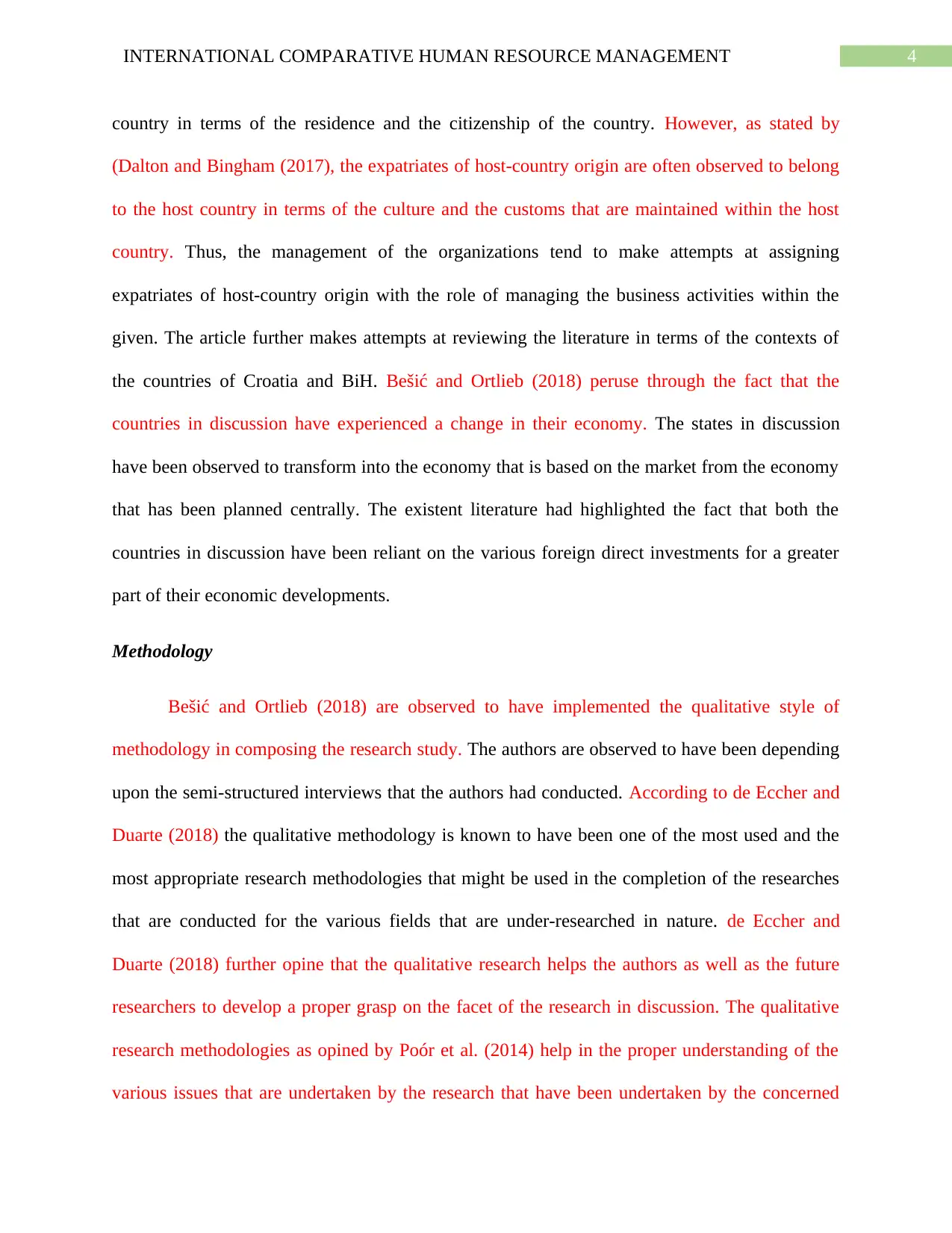
4INTERNATIONAL COMPARATIVE HUMAN RESOURCE MANAGEMENT
country in terms of the residence and the citizenship of the country. However, as stated by
(Dalton and Bingham (2017), the expatriates of host‐country origin are often observed to belong
to the host country in terms of the culture and the customs that are maintained within the host
country. Thus, the management of the organizations tend to make attempts at assigning
expatriates of host‐country origin with the role of managing the business activities within the
given. The article further makes attempts at reviewing the literature in terms of the contexts of
the countries of Croatia and BiH. Bešić and Ortlieb (2018) peruse through the fact that the
countries in discussion have experienced a change in their economy. The states in discussion
have been observed to transform into the economy that is based on the market from the economy
that has been planned centrally. The existent literature had highlighted the fact that both the
countries in discussion have been reliant on the various foreign direct investments for a greater
part of their economic developments.
Methodology
Bešić and Ortlieb (2018) are observed to have implemented the qualitative style of
methodology in composing the research study. The authors are observed to have been depending
upon the semi-structured interviews that the authors had conducted. According to de Eccher and
Duarte (2018) the qualitative methodology is known to have been one of the most used and the
most appropriate research methodologies that might be used in the completion of the researches
that are conducted for the various fields that are under-researched in nature. de Eccher and
Duarte (2018) further opine that the qualitative research helps the authors as well as the future
researchers to develop a proper grasp on the facet of the research in discussion. The qualitative
research methodologies as opined by Poór et al. (2014) help in the proper understanding of the
various issues that are undertaken by the research that have been undertaken by the concerned
country in terms of the residence and the citizenship of the country. However, as stated by
(Dalton and Bingham (2017), the expatriates of host‐country origin are often observed to belong
to the host country in terms of the culture and the customs that are maintained within the host
country. Thus, the management of the organizations tend to make attempts at assigning
expatriates of host‐country origin with the role of managing the business activities within the
given. The article further makes attempts at reviewing the literature in terms of the contexts of
the countries of Croatia and BiH. Bešić and Ortlieb (2018) peruse through the fact that the
countries in discussion have experienced a change in their economy. The states in discussion
have been observed to transform into the economy that is based on the market from the economy
that has been planned centrally. The existent literature had highlighted the fact that both the
countries in discussion have been reliant on the various foreign direct investments for a greater
part of their economic developments.
Methodology
Bešić and Ortlieb (2018) are observed to have implemented the qualitative style of
methodology in composing the research study. The authors are observed to have been depending
upon the semi-structured interviews that the authors had conducted. According to de Eccher and
Duarte (2018) the qualitative methodology is known to have been one of the most used and the
most appropriate research methodologies that might be used in the completion of the researches
that are conducted for the various fields that are under-researched in nature. de Eccher and
Duarte (2018) further opine that the qualitative research helps the authors as well as the future
researchers to develop a proper grasp on the facet of the research in discussion. The qualitative
research methodologies as opined by Poór et al. (2014) help in the proper understanding of the
various issues that are undertaken by the research that have been undertaken by the concerned
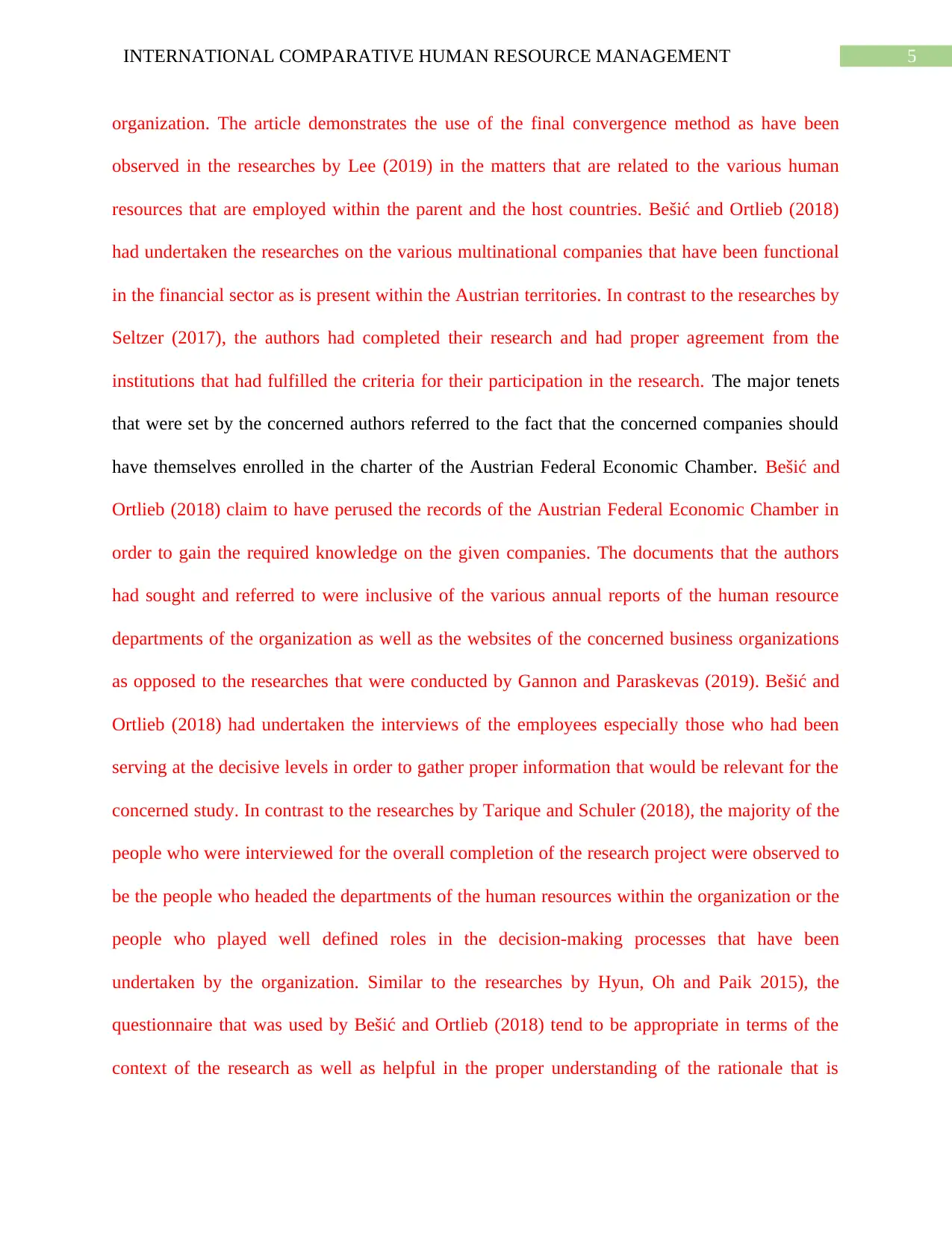
5INTERNATIONAL COMPARATIVE HUMAN RESOURCE MANAGEMENT
organization. The article demonstrates the use of the final convergence method as have been
observed in the researches by Lee (2019) in the matters that are related to the various human
resources that are employed within the parent and the host countries. Bešić and Ortlieb (2018)
had undertaken the researches on the various multinational companies that have been functional
in the financial sector as is present within the Austrian territories. In contrast to the researches by
Seltzer (2017), the authors had completed their research and had proper agreement from the
institutions that had fulfilled the criteria for their participation in the research. The major tenets
that were set by the concerned authors referred to the fact that the concerned companies should
have themselves enrolled in the charter of the Austrian Federal Economic Chamber. Bešić and
Ortlieb (2018) claim to have perused the records of the Austrian Federal Economic Chamber in
order to gain the required knowledge on the given companies. The documents that the authors
had sought and referred to were inclusive of the various annual reports of the human resource
departments of the organization as well as the websites of the concerned business organizations
as opposed to the researches that were conducted by Gannon and Paraskevas (2019). Bešić and
Ortlieb (2018) had undertaken the interviews of the employees especially those who had been
serving at the decisive levels in order to gather proper information that would be relevant for the
concerned study. In contrast to the researches by Tarique and Schuler (2018), the majority of the
people who were interviewed for the overall completion of the research project were observed to
be the people who headed the departments of the human resources within the organization or the
people who played well defined roles in the decision-making processes that have been
undertaken by the organization. Similar to the researches by Hyun, Oh and Paik 2015), the
questionnaire that was used by Bešić and Ortlieb (2018) tend to be appropriate in terms of the
context of the research as well as helpful in the proper understanding of the rationale that is
organization. The article demonstrates the use of the final convergence method as have been
observed in the researches by Lee (2019) in the matters that are related to the various human
resources that are employed within the parent and the host countries. Bešić and Ortlieb (2018)
had undertaken the researches on the various multinational companies that have been functional
in the financial sector as is present within the Austrian territories. In contrast to the researches by
Seltzer (2017), the authors had completed their research and had proper agreement from the
institutions that had fulfilled the criteria for their participation in the research. The major tenets
that were set by the concerned authors referred to the fact that the concerned companies should
have themselves enrolled in the charter of the Austrian Federal Economic Chamber. Bešić and
Ortlieb (2018) claim to have perused the records of the Austrian Federal Economic Chamber in
order to gain the required knowledge on the given companies. The documents that the authors
had sought and referred to were inclusive of the various annual reports of the human resource
departments of the organization as well as the websites of the concerned business organizations
as opposed to the researches that were conducted by Gannon and Paraskevas (2019). Bešić and
Ortlieb (2018) had undertaken the interviews of the employees especially those who had been
serving at the decisive levels in order to gather proper information that would be relevant for the
concerned study. In contrast to the researches by Tarique and Schuler (2018), the majority of the
people who were interviewed for the overall completion of the research project were observed to
be the people who headed the departments of the human resources within the organization or the
people who played well defined roles in the decision-making processes that have been
undertaken by the organization. Similar to the researches by Hyun, Oh and Paik 2015), the
questionnaire that was used by Bešić and Ortlieb (2018) tend to be appropriate in terms of the
context of the research as well as helpful in the proper understanding of the rationale that is
⊘ This is a preview!⊘
Do you want full access?
Subscribe today to unlock all pages.

Trusted by 1+ million students worldwide
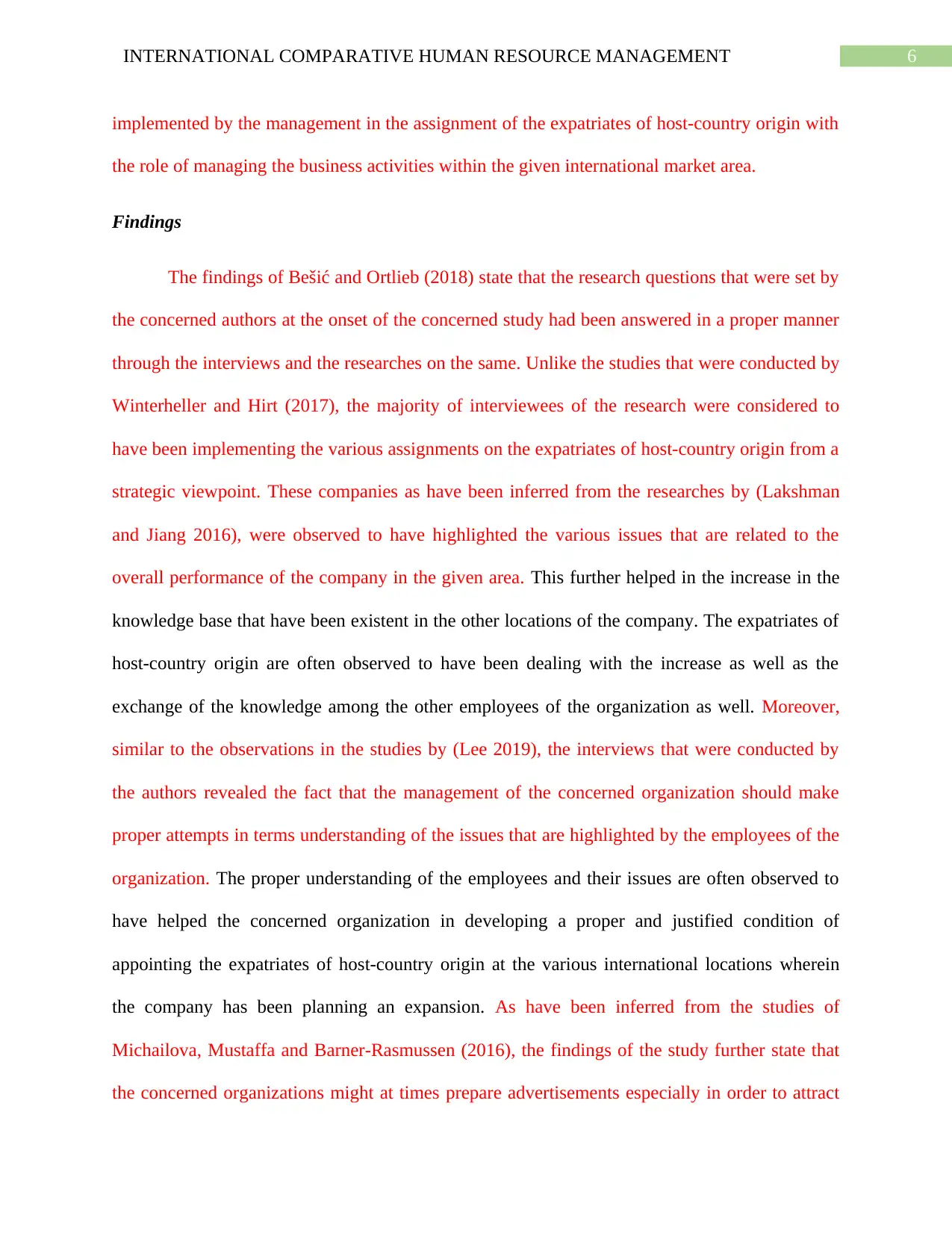
6INTERNATIONAL COMPARATIVE HUMAN RESOURCE MANAGEMENT
implemented by the management in the assignment of the expatriates of host‐country origin with
the role of managing the business activities within the given international market area.
Findings
The findings of Bešić and Ortlieb (2018) state that the research questions that were set by
the concerned authors at the onset of the concerned study had been answered in a proper manner
through the interviews and the researches on the same. Unlike the studies that were conducted by
Winterheller and Hirt (2017), the majority of interviewees of the research were considered to
have been implementing the various assignments on the expatriates of host‐country origin from a
strategic viewpoint. These companies as have been inferred from the researches by (Lakshman
and Jiang 2016), were observed to have highlighted the various issues that are related to the
overall performance of the company in the given area. This further helped in the increase in the
knowledge base that have been existent in the other locations of the company. The expatriates of
host‐country origin are often observed to have been dealing with the increase as well as the
exchange of the knowledge among the other employees of the organization as well. Moreover,
similar to the observations in the studies by (Lee 2019), the interviews that were conducted by
the authors revealed the fact that the management of the concerned organization should make
proper attempts in terms understanding of the issues that are highlighted by the employees of the
organization. The proper understanding of the employees and their issues are often observed to
have helped the concerned organization in developing a proper and justified condition of
appointing the expatriates of host‐country origin at the various international locations wherein
the company has been planning an expansion. As have been inferred from the studies of
Michailova, Mustaffa and Barner-Rasmussen (2016), the findings of the study further state that
the concerned organizations might at times prepare advertisements especially in order to attract
implemented by the management in the assignment of the expatriates of host‐country origin with
the role of managing the business activities within the given international market area.
Findings
The findings of Bešić and Ortlieb (2018) state that the research questions that were set by
the concerned authors at the onset of the concerned study had been answered in a proper manner
through the interviews and the researches on the same. Unlike the studies that were conducted by
Winterheller and Hirt (2017), the majority of interviewees of the research were considered to
have been implementing the various assignments on the expatriates of host‐country origin from a
strategic viewpoint. These companies as have been inferred from the researches by (Lakshman
and Jiang 2016), were observed to have highlighted the various issues that are related to the
overall performance of the company in the given area. This further helped in the increase in the
knowledge base that have been existent in the other locations of the company. The expatriates of
host‐country origin are often observed to have been dealing with the increase as well as the
exchange of the knowledge among the other employees of the organization as well. Moreover,
similar to the observations in the studies by (Lee 2019), the interviews that were conducted by
the authors revealed the fact that the management of the concerned organization should make
proper attempts in terms understanding of the issues that are highlighted by the employees of the
organization. The proper understanding of the employees and their issues are often observed to
have helped the concerned organization in developing a proper and justified condition of
appointing the expatriates of host‐country origin at the various international locations wherein
the company has been planning an expansion. As have been inferred from the studies of
Michailova, Mustaffa and Barner-Rasmussen (2016), the findings of the study further state that
the concerned organizations might at times prepare advertisements especially in order to attract
Paraphrase This Document
Need a fresh take? Get an instant paraphrase of this document with our AI Paraphraser
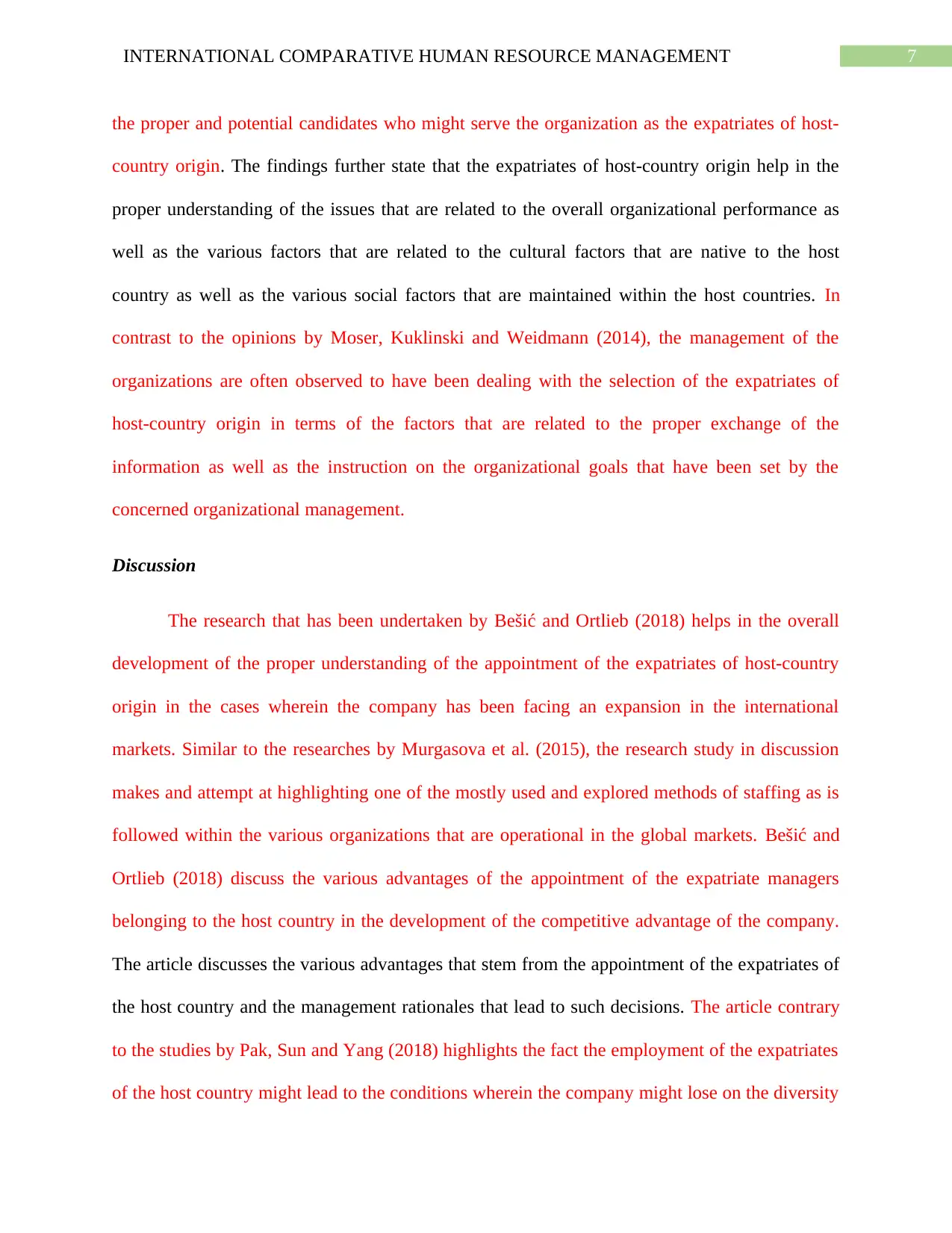
7INTERNATIONAL COMPARATIVE HUMAN RESOURCE MANAGEMENT
the proper and potential candidates who might serve the organization as the expatriates of host‐
country origin. The findings further state that the expatriates of host‐country origin help in the
proper understanding of the issues that are related to the overall organizational performance as
well as the various factors that are related to the cultural factors that are native to the host
country as well as the various social factors that are maintained within the host countries. In
contrast to the opinions by Moser, Kuklinski and Weidmann (2014), the management of the
organizations are often observed to have been dealing with the selection of the expatriates of
host‐country origin in terms of the factors that are related to the proper exchange of the
information as well as the instruction on the organizational goals that have been set by the
concerned organizational management.
Discussion
The research that has been undertaken by Bešić and Ortlieb (2018) helps in the overall
development of the proper understanding of the appointment of the expatriates of host‐country
origin in the cases wherein the company has been facing an expansion in the international
markets. Similar to the researches by Murgasova et al. (2015), the research study in discussion
makes and attempt at highlighting one of the mostly used and explored methods of staffing as is
followed within the various organizations that are operational in the global markets. Bešić and
Ortlieb (2018) discuss the various advantages of the appointment of the expatriate managers
belonging to the host country in the development of the competitive advantage of the company.
The article discusses the various advantages that stem from the appointment of the expatriates of
the host country and the management rationales that lead to such decisions. The article contrary
to the studies by Pak, Sun and Yang (2018) highlights the fact the employment of the expatriates
of the host country might lead to the conditions wherein the company might lose on the diversity
the proper and potential candidates who might serve the organization as the expatriates of host‐
country origin. The findings further state that the expatriates of host‐country origin help in the
proper understanding of the issues that are related to the overall organizational performance as
well as the various factors that are related to the cultural factors that are native to the host
country as well as the various social factors that are maintained within the host countries. In
contrast to the opinions by Moser, Kuklinski and Weidmann (2014), the management of the
organizations are often observed to have been dealing with the selection of the expatriates of
host‐country origin in terms of the factors that are related to the proper exchange of the
information as well as the instruction on the organizational goals that have been set by the
concerned organizational management.
Discussion
The research that has been undertaken by Bešić and Ortlieb (2018) helps in the overall
development of the proper understanding of the appointment of the expatriates of host‐country
origin in the cases wherein the company has been facing an expansion in the international
markets. Similar to the researches by Murgasova et al. (2015), the research study in discussion
makes and attempt at highlighting one of the mostly used and explored methods of staffing as is
followed within the various organizations that are operational in the global markets. Bešić and
Ortlieb (2018) discuss the various advantages of the appointment of the expatriate managers
belonging to the host country in the development of the competitive advantage of the company.
The article discusses the various advantages that stem from the appointment of the expatriates of
the host country and the management rationales that lead to such decisions. The article contrary
to the studies by Pak, Sun and Yang (2018) highlights the fact the employment of the expatriates
of the host country might lead to the conditions wherein the company might lose on the diversity
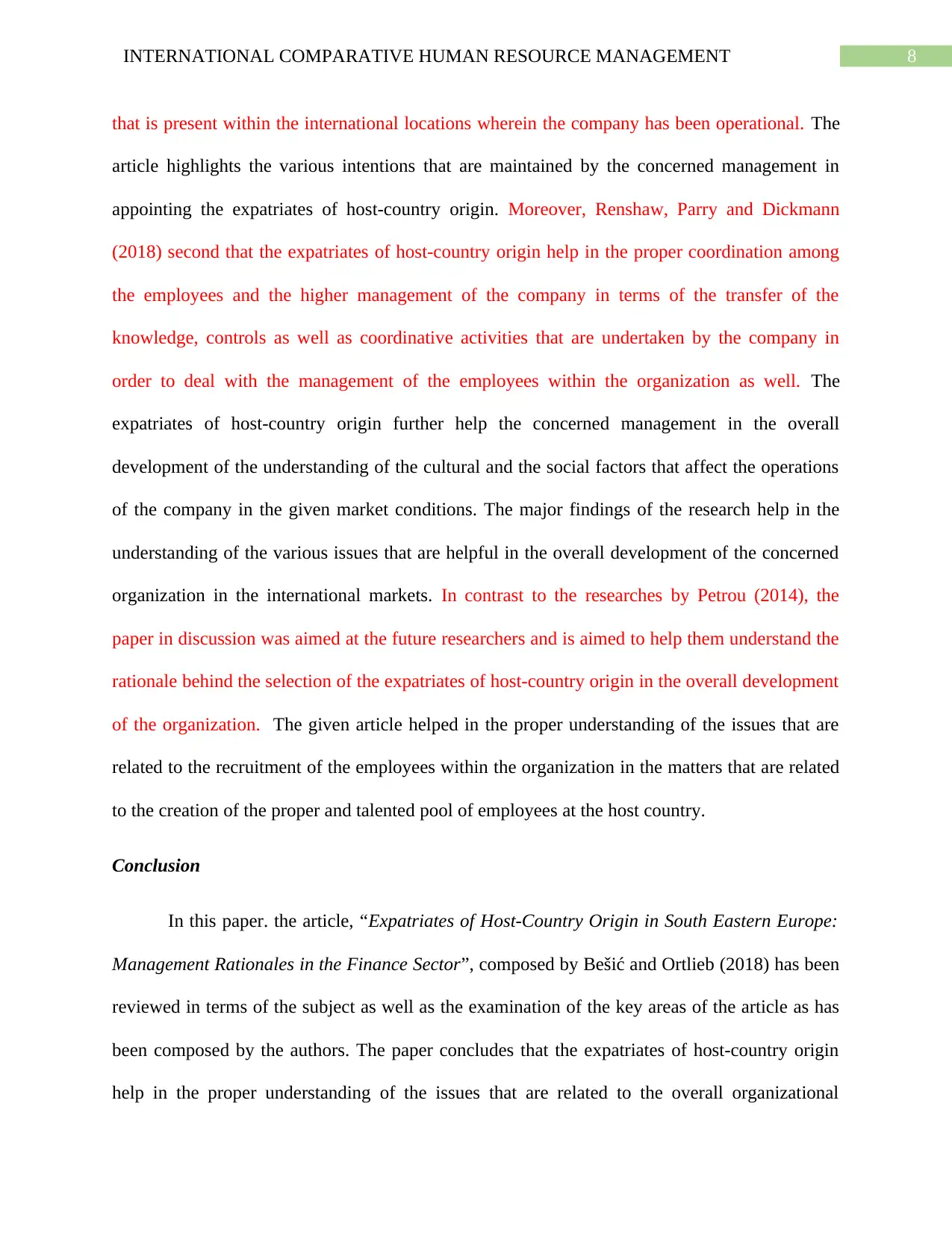
8INTERNATIONAL COMPARATIVE HUMAN RESOURCE MANAGEMENT
that is present within the international locations wherein the company has been operational. The
article highlights the various intentions that are maintained by the concerned management in
appointing the expatriates of host‐country origin. Moreover, Renshaw, Parry and Dickmann
(2018) second that the expatriates of host‐country origin help in the proper coordination among
the employees and the higher management of the company in terms of the transfer of the
knowledge, controls as well as coordinative activities that are undertaken by the company in
order to deal with the management of the employees within the organization as well. The
expatriates of host‐country origin further help the concerned management in the overall
development of the understanding of the cultural and the social factors that affect the operations
of the company in the given market conditions. The major findings of the research help in the
understanding of the various issues that are helpful in the overall development of the concerned
organization in the international markets. In contrast to the researches by Petrou (2014), the
paper in discussion was aimed at the future researchers and is aimed to help them understand the
rationale behind the selection of the expatriates of host‐country origin in the overall development
of the organization. The given article helped in the proper understanding of the issues that are
related to the recruitment of the employees within the organization in the matters that are related
to the creation of the proper and talented pool of employees at the host country.
Conclusion
In this paper. the article, “Expatriates of Host‐Country Origin in South Eastern Europe:
Management Rationales in the Finance Sector”, composed by Bešić and Ortlieb (2018) has been
reviewed in terms of the subject as well as the examination of the key areas of the article as has
been composed by the authors. The paper concludes that the expatriates of host‐country origin
help in the proper understanding of the issues that are related to the overall organizational
that is present within the international locations wherein the company has been operational. The
article highlights the various intentions that are maintained by the concerned management in
appointing the expatriates of host‐country origin. Moreover, Renshaw, Parry and Dickmann
(2018) second that the expatriates of host‐country origin help in the proper coordination among
the employees and the higher management of the company in terms of the transfer of the
knowledge, controls as well as coordinative activities that are undertaken by the company in
order to deal with the management of the employees within the organization as well. The
expatriates of host‐country origin further help the concerned management in the overall
development of the understanding of the cultural and the social factors that affect the operations
of the company in the given market conditions. The major findings of the research help in the
understanding of the various issues that are helpful in the overall development of the concerned
organization in the international markets. In contrast to the researches by Petrou (2014), the
paper in discussion was aimed at the future researchers and is aimed to help them understand the
rationale behind the selection of the expatriates of host‐country origin in the overall development
of the organization. The given article helped in the proper understanding of the issues that are
related to the recruitment of the employees within the organization in the matters that are related
to the creation of the proper and talented pool of employees at the host country.
Conclusion
In this paper. the article, “Expatriates of Host‐Country Origin in South Eastern Europe:
Management Rationales in the Finance Sector”, composed by Bešić and Ortlieb (2018) has been
reviewed in terms of the subject as well as the examination of the key areas of the article as has
been composed by the authors. The paper concludes that the expatriates of host‐country origin
help in the proper understanding of the issues that are related to the overall organizational
⊘ This is a preview!⊘
Do you want full access?
Subscribe today to unlock all pages.

Trusted by 1+ million students worldwide
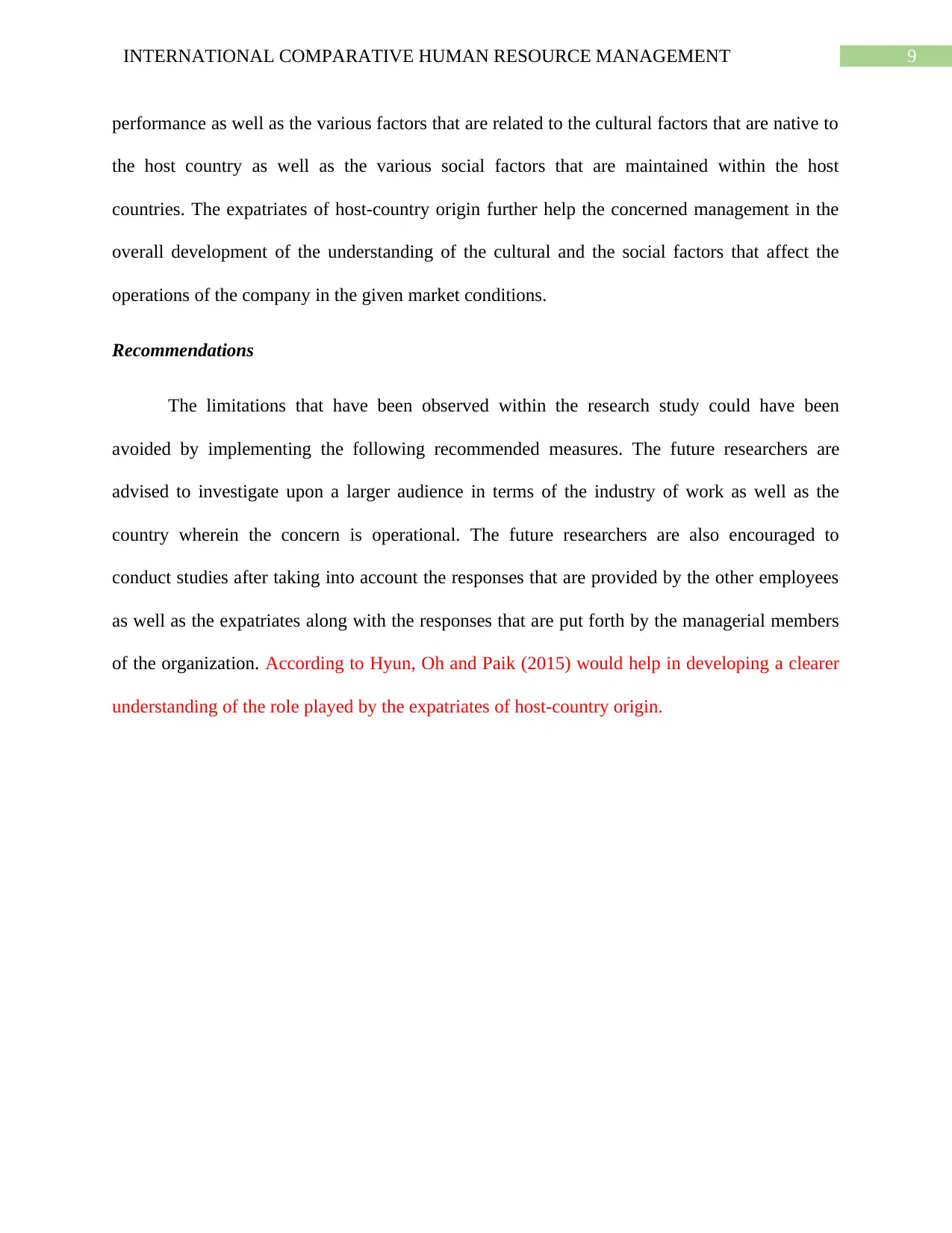
9INTERNATIONAL COMPARATIVE HUMAN RESOURCE MANAGEMENT
performance as well as the various factors that are related to the cultural factors that are native to
the host country as well as the various social factors that are maintained within the host
countries. The expatriates of host‐country origin further help the concerned management in the
overall development of the understanding of the cultural and the social factors that affect the
operations of the company in the given market conditions.
Recommendations
The limitations that have been observed within the research study could have been
avoided by implementing the following recommended measures. The future researchers are
advised to investigate upon a larger audience in terms of the industry of work as well as the
country wherein the concern is operational. The future researchers are also encouraged to
conduct studies after taking into account the responses that are provided by the other employees
as well as the expatriates along with the responses that are put forth by the managerial members
of the organization. According to Hyun, Oh and Paik (2015) would help in developing a clearer
understanding of the role played by the expatriates of host‐country origin.
performance as well as the various factors that are related to the cultural factors that are native to
the host country as well as the various social factors that are maintained within the host
countries. The expatriates of host‐country origin further help the concerned management in the
overall development of the understanding of the cultural and the social factors that affect the
operations of the company in the given market conditions.
Recommendations
The limitations that have been observed within the research study could have been
avoided by implementing the following recommended measures. The future researchers are
advised to investigate upon a larger audience in terms of the industry of work as well as the
country wherein the concern is operational. The future researchers are also encouraged to
conduct studies after taking into account the responses that are provided by the other employees
as well as the expatriates along with the responses that are put forth by the managerial members
of the organization. According to Hyun, Oh and Paik (2015) would help in developing a clearer
understanding of the role played by the expatriates of host‐country origin.
Paraphrase This Document
Need a fresh take? Get an instant paraphrase of this document with our AI Paraphraser
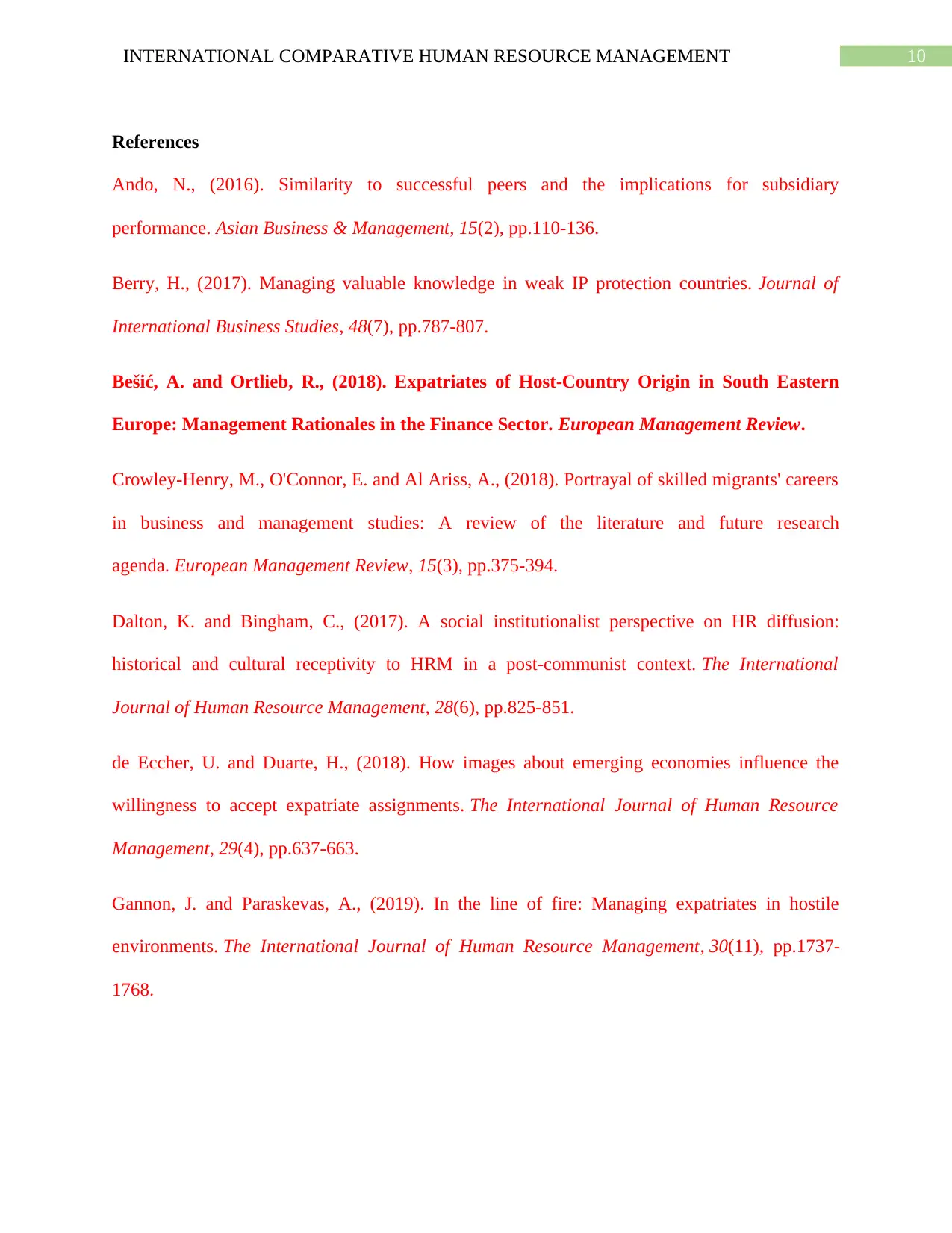
10INTERNATIONAL COMPARATIVE HUMAN RESOURCE MANAGEMENT
References
Ando, N., (2016). Similarity to successful peers and the implications for subsidiary
performance. Asian Business & Management, 15(2), pp.110-136.
Berry, H., (2017). Managing valuable knowledge in weak IP protection countries. Journal of
International Business Studies, 48(7), pp.787-807.
Bešić, A. and Ortlieb, R., (2018). Expatriates of Host‐Country Origin in South Eastern
Europe: Management Rationales in the Finance Sector. European Management Review.
Crowley‐Henry, M., O'Connor, E. and Al Ariss, A., (2018). Portrayal of skilled migrants' careers
in business and management studies: A review of the literature and future research
agenda. European Management Review, 15(3), pp.375-394.
Dalton, K. and Bingham, C., (2017). A social institutionalist perspective on HR diffusion:
historical and cultural receptivity to HRM in a post-communist context. The International
Journal of Human Resource Management, 28(6), pp.825-851.
de Eccher, U. and Duarte, H., (2018). How images about emerging economies influence the
willingness to accept expatriate assignments. The International Journal of Human Resource
Management, 29(4), pp.637-663.
Gannon, J. and Paraskevas, A., (2019). In the line of fire: Managing expatriates in hostile
environments. The International Journal of Human Resource Management, 30(11), pp.1737-
1768.
References
Ando, N., (2016). Similarity to successful peers and the implications for subsidiary
performance. Asian Business & Management, 15(2), pp.110-136.
Berry, H., (2017). Managing valuable knowledge in weak IP protection countries. Journal of
International Business Studies, 48(7), pp.787-807.
Bešić, A. and Ortlieb, R., (2018). Expatriates of Host‐Country Origin in South Eastern
Europe: Management Rationales in the Finance Sector. European Management Review.
Crowley‐Henry, M., O'Connor, E. and Al Ariss, A., (2018). Portrayal of skilled migrants' careers
in business and management studies: A review of the literature and future research
agenda. European Management Review, 15(3), pp.375-394.
Dalton, K. and Bingham, C., (2017). A social institutionalist perspective on HR diffusion:
historical and cultural receptivity to HRM in a post-communist context. The International
Journal of Human Resource Management, 28(6), pp.825-851.
de Eccher, U. and Duarte, H., (2018). How images about emerging economies influence the
willingness to accept expatriate assignments. The International Journal of Human Resource
Management, 29(4), pp.637-663.
Gannon, J. and Paraskevas, A., (2019). In the line of fire: Managing expatriates in hostile
environments. The International Journal of Human Resource Management, 30(11), pp.1737-
1768.
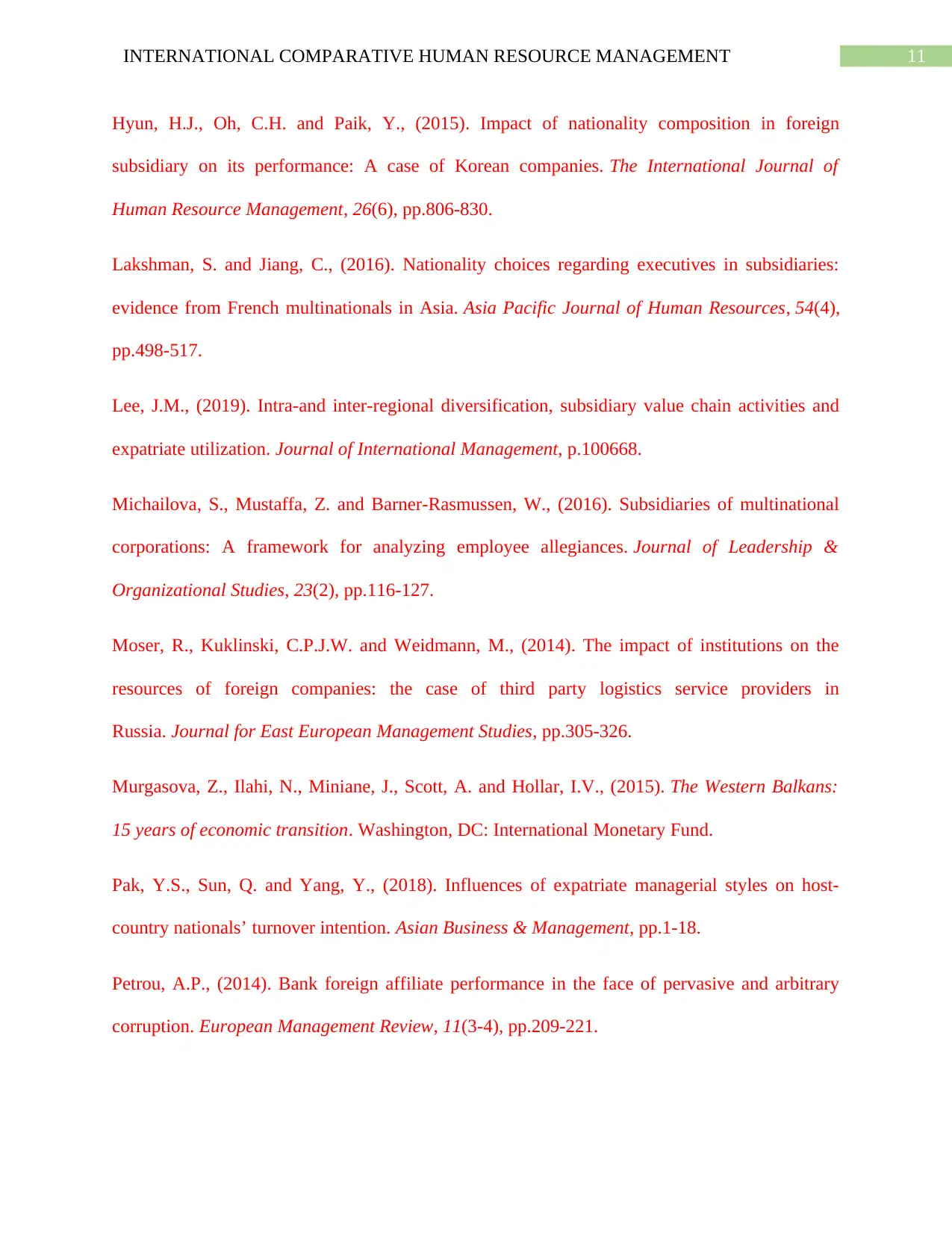
11INTERNATIONAL COMPARATIVE HUMAN RESOURCE MANAGEMENT
Hyun, H.J., Oh, C.H. and Paik, Y., (2015). Impact of nationality composition in foreign
subsidiary on its performance: A case of Korean companies. The International Journal of
Human Resource Management, 26(6), pp.806-830.
Lakshman, S. and Jiang, C., (2016). Nationality choices regarding executives in subsidiaries:
evidence from French multinationals in Asia. Asia Pacific Journal of Human Resources, 54(4),
pp.498-517.
Lee, J.M., (2019). Intra-and inter-regional diversification, subsidiary value chain activities and
expatriate utilization. Journal of International Management, p.100668.
Michailova, S., Mustaffa, Z. and Barner-Rasmussen, W., (2016). Subsidiaries of multinational
corporations: A framework for analyzing employee allegiances. Journal of Leadership &
Organizational Studies, 23(2), pp.116-127.
Moser, R., Kuklinski, C.P.J.W. and Weidmann, M., (2014). The impact of institutions on the
resources of foreign companies: the case of third party logistics service providers in
Russia. Journal for East European Management Studies, pp.305-326.
Murgasova, Z., Ilahi, N., Miniane, J., Scott, A. and Hollar, I.V., (2015). The Western Balkans:
15 years of economic transition. Washington, DC: International Monetary Fund.
Pak, Y.S., Sun, Q. and Yang, Y., (2018). Influences of expatriate managerial styles on host-
country nationals’ turnover intention. Asian Business & Management, pp.1-18.
Petrou, A.P., (2014). Bank foreign affiliate performance in the face of pervasive and arbitrary
corruption. European Management Review, 11(3-4), pp.209-221.
Hyun, H.J., Oh, C.H. and Paik, Y., (2015). Impact of nationality composition in foreign
subsidiary on its performance: A case of Korean companies. The International Journal of
Human Resource Management, 26(6), pp.806-830.
Lakshman, S. and Jiang, C., (2016). Nationality choices regarding executives in subsidiaries:
evidence from French multinationals in Asia. Asia Pacific Journal of Human Resources, 54(4),
pp.498-517.
Lee, J.M., (2019). Intra-and inter-regional diversification, subsidiary value chain activities and
expatriate utilization. Journal of International Management, p.100668.
Michailova, S., Mustaffa, Z. and Barner-Rasmussen, W., (2016). Subsidiaries of multinational
corporations: A framework for analyzing employee allegiances. Journal of Leadership &
Organizational Studies, 23(2), pp.116-127.
Moser, R., Kuklinski, C.P.J.W. and Weidmann, M., (2014). The impact of institutions on the
resources of foreign companies: the case of third party logistics service providers in
Russia. Journal for East European Management Studies, pp.305-326.
Murgasova, Z., Ilahi, N., Miniane, J., Scott, A. and Hollar, I.V., (2015). The Western Balkans:
15 years of economic transition. Washington, DC: International Monetary Fund.
Pak, Y.S., Sun, Q. and Yang, Y., (2018). Influences of expatriate managerial styles on host-
country nationals’ turnover intention. Asian Business & Management, pp.1-18.
Petrou, A.P., (2014). Bank foreign affiliate performance in the face of pervasive and arbitrary
corruption. European Management Review, 11(3-4), pp.209-221.
⊘ This is a preview!⊘
Do you want full access?
Subscribe today to unlock all pages.

Trusted by 1+ million students worldwide
1 out of 13
Related Documents
Your All-in-One AI-Powered Toolkit for Academic Success.
+13062052269
info@desklib.com
Available 24*7 on WhatsApp / Email
![[object Object]](/_next/static/media/star-bottom.7253800d.svg)
Unlock your academic potential
Copyright © 2020–2026 A2Z Services. All Rights Reserved. Developed and managed by ZUCOL.





